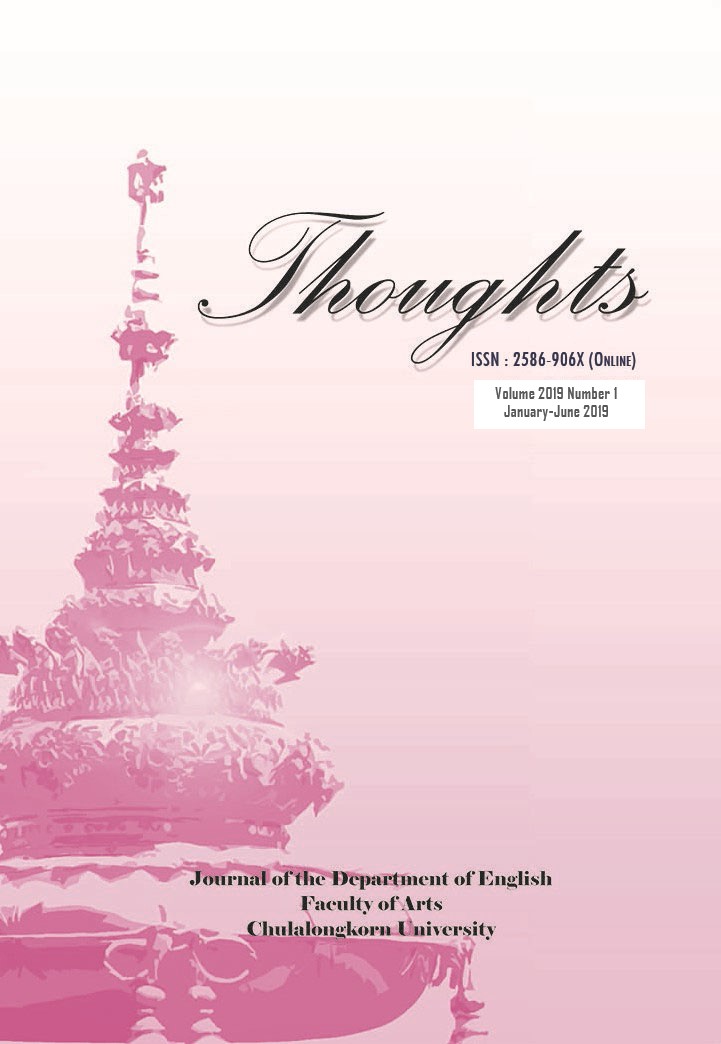The Dynamic of Desire in André Aciman’s Call Me by Your Name
Keywords:
Andre Aciman, Call Me by Your NameAbstract
This paper pursues two objectives. Its first aim is to investigate the dynamic of desire in André Aciman’s Call Me by Your Name. Deploying theories of emotions, it seeks to examine various treatments of desire in the novel. As shown in the development of the relationship between Elio and Oliver, their desires are contained, expanded, and compartmentalized throughout the course of the novel. The second objective is to explicate how Aciman’s treatment of desire can eventually create an affecting reading experience for his readers.
References
Aciman, A. (1994). Out of Egypt: A Memoir. New York: Picador.
Aciman, A. (2007). Call Me by Your Name. New York: Picador.
Aciman, A. (2013). Harvard Square: A Novel. New York: W.W. Nortin & Company.
Ahmed, S. (2006). Queer Phenomenology: Orientations, Objects, Others. Durham: Duke University Press.
Ahmed, S. (2010). The Promise of Happiness. Durham: Duke University Press.
Berlant, L. (2012). Desire/Love. Brooklyn, NY: Punctum Books.
D’Erasmo, S. (2007, February 25). Suddenly One Summer. The New York Times. Retrieved from http://www.nytimes.com/2007/02/25/books/review/DErasmo.t.html
Gorton, K. (2008). Theorising Desire: From Freud to Feminism to Film. New York: Palgrave Macmillan.
Harvey, K., & Shalom C. (Eds.). (1997). Introduction. In Language and Desire: Encoding Sex, Romance and Intimacy (pp. 1-17). London: Routledge.
Hoey, M. (1997). The Organisation of Narratives of Desire: A Study of First-Person Erotic Fantasies. In K. Harvey, & C. Shalom, (Eds.), Language and Desire: Encoding Sex, Romance and Intimacy (pp. 85-105). London: Routledge.
Israel-Pelletier, A. (2018). On the Mediterranean and the Nile: The Jews of Egypt. Bloomington, Indiana: Indiana University Press.
Kristeva, J. (1982). Powers of Horror: An Essay on Abjection. New York: Columbia UP.
Lacan, J. (1998). The Seminar of Jacques Lacan: Book XI. The Four Fundamental Concepts of Psychoanalysis (A.
Sheridan, Trans). New York: W.W. Norton & Company. (Original work published 1973).
Malaiwong, P. (2012). Sex, Political Economy, Citizenship: The Formation of Queer Theory in the U.S.. Thoughts, 2012(1), 1-13.
Moulton, I. (2014, July 2). Hamburger, Succulent, Grapes, and Ketchup: An Interview with André Aciman. Gigantic. Retrieved from http://thegiganticmag.com/magazine/ articleDetail.php?p=articleDetail&id=194
Newton, A. Z. (2005). The Elsewhere: On Belonging at a Near Distance: Reading Literary Memoir from Europe and the Levant. Madison: University of Wisconsin Press.
Reese, H. (2013, April 10). The Finished Copy: An Interview with André Aciman. Los Angeles Review of Books. Retrieved from https://lareviewofbooks.org/article/the-finished-copy-an-interview-with-andre-aciman/
Sartre, J. (1956). Being and Nothingness: An Essay on Phenomenological Ontology (H. Barnes, Trans). New York: Philosophical Library. (Original work published 1943).
Zarin, C. (2007, February 19). Briefly Noted: “Call Me by Your Name” (Farrar, Straus & Giroux; $23) by André Aciman. The New Yorker. Retrieved from https://www.newyorker.com/magazine/2007/02/19/briefly-noted-710
Zonana, J. (2016). “Enta Omri, You are My Life”: Embracing the Arab Self in Andrė Aciman’s Harvard Square. Studies in American Jewish Literature, 35(1), 33-51.
Downloads
Published
Issue
Section
License
Copyright by the Faculty of Arts, Chulalongkorn University.
Photocopying is allowed for internal, non-commercial use only. Photocopying for other uses or for purposes other than indicated must be permitted in writing from the Faculty of Arts, Chulalongkorn University.
All views or conclusion are those of the authors of the articles and not necessarily those of the publisher or the editorial staff.


